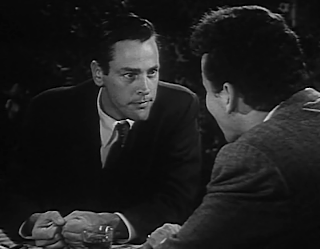Karl Malden won his Oscar from his first nomination for portraying Harold "Mitch" Mitchum in A Streetcar Named Desire.
Karl Malden portrays one of Stanley Kowalski (Marlon Brando)'s Poker buddies who attempts to court Stanley seriously troubled sister in-law Blanche DuBois (Vivien Leigh). Mitch is different than Stanley and his friends in that he dresses and acts much more properly and lives with his sick mother whom he takes care of. Malden is perfect in the role being an excellent foil against Marlon Brando's Stanley. Malden portrays Mitch as calmly, and as reserved just as Brando portrays Stanley as loud, and outrageous. Malden makes Mitch almost the opposite of Brando in his quiet portrayal, but he is always careful to show that Mitch still is from the same exact world as the other men as well.
Mitch certainly is proper, and dresses in fine clothing, and tries to treat women in a gentlemanly fashion as well. Malden though carefully portrays the idea of how much of a true gentleman Mitch is. Malden is effective because he does leave it just enough of a mystery of Mitch. Yes it does seem Mitch genuinely does want to try to be a better sort of man than his friends, but there is always a undercurrent that puts just the right degree of doubt on this as well. There is just the right indication in Malden performance to suggest that part of this might be a bit of a put on caused by his mother's influence. Malden though perfectly makes it so you can't call Mitch a true gentleman, nor just putting on a facade he is something in between.
The most important part of his character though is Mitch's relationship with Blanche DuBois. Malden of course needs to stand along with Vivien Leigh's towering performance, and he keeps up with her every step of the way. Malden though not only stays with Leigh he also avoid being just a supporting man to her. While Leigh has some of her biggest scenes in Malden's presence, Malden never lets himself or Mitch become overshadowed. Even in some of her most dramatic moments Malden still has a prescne in these scenes. He makes Mitch his own man, who never becomes simply just the possible suitor of Blanche DuBois but rather is in his own right an interesting character.
Malden has an interesting and unique chemistry with Leigh that works well in the film. Malden shows that Mitch is honestly quite taken with Blanche, but he also shows that he is almost out of his element when it comes to relating to the woman. Malden shows that Mitch is always trying to be the proper gentleman with her, as much of one as he possibly can be, but Malden always has a shade in his performance reflecting Mitch's inability to truly understand the woman. Malden does not portray it as if Mitch is stupid, but rather Mitch just in reality is simply not able to fully comprehend the past of Blanche, even though Malden shows that Mitch struggles hard to do so.
Karl Malden is excellent in his later scene where after Mitch had discovered the truth behind Blanche, and confronts her over the truth. Malden although is not as outwardly cruel as Brando, there is a certainly almost more painful cruelty employed by Malden in this scene. Malden shows that Mitch is not trying to purposefully destructive toward Blanche, but rather it is almost a gut reaction from Mitch. Malden has that Mitch still does not fully understand, and does not know how really to deal with it so he takes it out on Blanche. Malden is excellent here because he not only brings to life his blunt attack on Blanche, but that it all comes from his own pain and distress from his loss.
Malden does not have a false moment during the film. It is an excellent portrait of this man, and even though Mitch never is the exact focus of any scene Malden nevertheless realizes a complex characterization. There is not a wasted moment in his performance. Mitch frankly could have been little more than just part of the background, but Malden never lets himself to be forgotten. In just the smallest glances, or reactions he says so much. His small little look over the mention of his mother is perfectly amazing in that single expression shows that Mitch in fact hates his mother. Moments like that perpetuate through his performance, and creates a powerful depiction that does far more than simply help Vivien Leigh's performance. Malden makes his work stand alone as well as truly great work from a great actor.





























